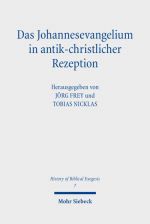Citation:

Abstract:
Η μελέτη διερευνά την ερμηνεία του στίχου περί της δωρεάς του Αγίου Πνεύματος στους μαθητές από τον αναστάντα Ιησού μετά την Ανάστασή του στο Ιω. 20:22 από την πατερική γραμματεία του τέταρτου και του πέμπτου αιώνα, εστιάζοντας αντιπροσωπευτικά στις ερμηνείες των Κυρίλλου Ιεροσολύμων, Ιερωνύμου, Ιωάννη Χρυσοστόμου, Αυγουστίνου και Κυρίλλου Αλεξανδρείας. Από τη διερεύνηση αυτή προκύπτουν τα εξής συμπεράσματα: 1) Δεν υπάρχει ουσιαστική διαφοροποίηση μεταξύ δυτικής και ανατολικής, λατινόφωνης και ελληνόφωνης, αντιοχειανής και αλεξανδρινής εξήγησης. Όπως φαίνεται, έχουν επικρατήσει στη χριστιανική εκκλησία της εποχής συγκεκριμένες τάσεις μιας χριστολογικής και πνευματολογικής ερμηνείας του Ιωα 20:22, παρά λίγες επιμέρους διαφοροποιήσεις και παραλλαγές. Το λεγόμενο Filioque εμφανίζεται μόνο στον Αυγουστίνο σε μια πρώιμη μορφή του, διακριτή από την αντίληψη περί «οικονομικού filioque» των ανατολικών Πατέρων της Εκκλησίας. Σχεδόν όλοι οι εξεταζόμενοι στη μελέτη Πατέρες συνδέουν την εμφύσηση του Αγίου Πνεύματος με την ιστορία της δημιουργίας (Γεν 2:7), αλλά διαφοροποιούν το Πνεύμα από την ανθρώπινη ψυχή. Εξάλλου στηρίζονται σε παράλληλα βιβλικά κείμενα και όχι σε άλλους εκκλησιαστικούς συγγραφείς καθιστώντας έτσι, παρά τη δεδομένη μεταξύ τους αλληλεπίδραση, τη Βίβλο καθεαυτήν την κατεξοχήν αναμφισβήτητη θεολογική αυθεντία της εποχής τους. Για την ερμηνεία τους, λόγω ακριβώς του δογματικού ενδιαφέροντός της, αποφεύγουν να χρησιμοποιήσουν τις μεθόδους της αλληγορίας και της τυπολογίας. Τέλος, θεωρούν ότι οι διηγήσεις περί της δωρεάς του Αγίου Πνεύματος στο κατά Ιωάννην Ευαγγέλιο και στις Πράξεις των Αποστόλων αναφέρονται σε δύο διαφορετικά γεγονότα και όχι στο ίδιο γεγονός, αν και βέβαια τονίζουν ότι πρόκειται για το ίδιο Πνεύμα, το οποίο όμως παρέχει στους αποστόλους σε κάθε ένα από τα δύο αυτά περιστατικά διαφορετικά χαρίσματα. Αναδεικνύοντας και υπογραμμίζοντας η μελέτη τα βασικά θεολογικά μοτίβα της ερμηνείας του Ιωα 20:22 στην πατερική παράδοση φωτίζει τις θεολογικές τάσεις και συζητήσεις μιας άκρως σημαντικής για την ιστορία του Χριστιανισμού περιόδου, κατά την οποία τίθενται τα δογματικά θεμέλια της ανάπτυξής του μέχρι και τη νεότερη εποχή.
This study investigates the interpretation of John 20:22, concerning the risen Jesus’ bestowal of the Holy Spirit upon his disciples, as reflected in the patristic literature of the fourth and fifth centuries. It focuses on the representative exegeses of Cyril of Jerusalem, Jerome, John Chrysostom, Augustine of Hippo, and Cyril of Alexandria. The investigation yields the following conclusions: There is no substantial differentiation between Western and Eastern, Latin and Greek, Antiochian and Alexandrian interpretations. Certain trends of Christological and pneumatological exegesis of John 20:22 had already become predominant in the Christian Churches of the time, despite minor variations and differences. The concept of the Filioque appears solely in Augustine, in an early form distinct from the “economic Filioque” perspective of the Eastern Fathers. Nearly all the Church Fathers examined in the study associate Jesus’ breathing of the Holy Spirit with the creation narrative of Genesis 2:7. However, they make a clear distinction between the Holy Spirit and the human soul. The patristic authors base their interpretations on parallel biblical texts rather than on other ecclesiastical writers. Thus, despite the evident interaction among them, the Bible itself emerges as the preeminent and unquestionable theological authority of their era. Due to the doctrinal nature of their interpretations, the Fathers refrain from employing allegory or typology in their analyses. They unanimously consider the Johannine and Lukan accounts of the giving of the Holy Spirit as referring to two distinct events rather than to the same occurrence. However, they emphasize that the same Spirit is involved in both instances, though it imparts different gifts to the apostles in each case. By highlighting the theological motifs of John 20:22 in the patristic tradition, the study sheds light on the theological trends and discussions of a critical period in Christian history, during which the doctrinal foundations for Christianity's development into the modern era were established.

